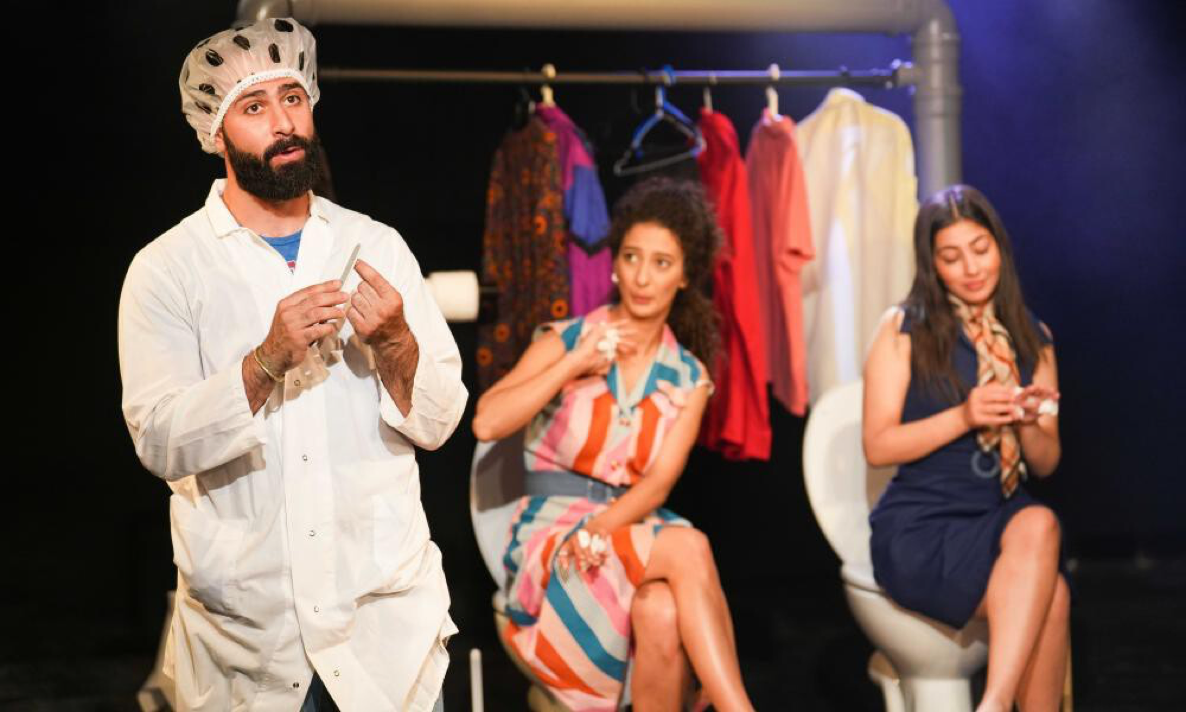Palestinian performers say musical satire Queen of a Bathtub is more relevant than ever
Hanoch Levin’s Queen of a Bathtub is widely held to be Israel’s most controversial play – a musical that used satire to attack perceived militarism, self-righteousness and racism in the aftermath of Israel’s victory in the 1967 war and was cancelled after just 19 performances in 1970.
This came after a bomb scare at Tel Aviv’s Cameri theatre, rock throwing at actors in Jerusalem and allegations that a “satanic” Levin was stabbing the country in the back as it fought for survival.
It is now, more than half a century on, being revived in Jaffa amid a sense among its Palestinian performers it is more relevant than ever.
Levin, who died in 1999, highlighted what he saw as as a gap between the way Israelis saw themselves as moral people who are “OK” and the reality of their country’s occupation of the West Bank and Gaza, in his view, that they oppress Arabs, prefer keeping occupied land over trying to make peace and send their children to die in battle for no good reason.
He had zero tolerance for the wave of nationalist euphoria that swept most of the country with the seemingly miraculous victory in the 1967 six-day war and the “liberation” of biblically resonant sites.
On the contrary, in one sketch of the musical, he has Israelis revoke the Ten Commandments given to their forebears at Mount Sinai for reasons including “state security”.
In another, he has the then prime minister, Golda Meir (the queen in the play’s title), apply pressure to the foreign minister Abba Eban’s crotch to ensure he does not make any dovish proposals.
Amid settler violence, Israeli army operations on the West Bank, Palestinian attacks in Israel and heightened pressure on Palestinian citizens of Israel by the most far-right government in the country’s history, the play is back on stage, showing that the issues at hand did not start with Benjamin Netanyahu.
“You can’t just say it’s 50-year-old satire. It definitely speaks of where we are today,” says Shai Bar Yaacov, the theatre critic for Yedioth Ahronoth newspaper.
“I would say that 80 to 90 % of Israelis still want to see themselves as ‘OKk’ people who are moral and have values. But together with this, we have not a few flaws of racist thought and admiration for militarism.”
This production at the Jaffa theatre has a twist: the show is still in Hebrew but the cast – Mouna Hawa, Wattan El-Gani, Bassam Biromi and Rami Saliba – are all Palestinian citizens of Israel, something they and the producer, Rabia Huri, hope gives added irony and power to Levin’s texts.
“We can really express our pain and anger through what Levin wrote,” Huri says. “Every person has his protest and role to bring change or express anger. This play is one of the ways I convey protest as a Palestinian.”
In Huri’s view, the racism Levin accuses Jewish Israelis of is older than the country itself. “It’s been there always. There are periods and then there are periods. The descent didn’t stop and it can get even worse.”
One sketch that has deep resonance for Huri concerns a Palestinian from the occupied territories who is employed by Israelis. They marvel that he walks on two legs like they do, and can hardly hold back their desire to beat him to a pulp. They scorn the Arab for not recognising how humane they are for not smashing his skull.
When they are about to harm him anyway, one of the Israeli women, who identifies herself as the mother of a combat soldier and a daughter of Holocaust survivors, intervenes and advises not to hurt the Arab “because there are a lot of dirty dishes in the kitchen”.
“What did this Arab do? Nothing. Levin is showing the violence, racism and supremacism of these people,” Huri says, traits that he argues are now reflected on a larger scale through settler revenge onslaughts against civilians and their property in the West Bank.
Hawa, a proud Palestinian from Haifa, is cast in many roles including as Meir. “Part of me didn’t want to do something in Hebrew, in their language, but I believe that art can make people think and change their perception.
“This play is like putting a mirror to them and the fact that I’m Palestinian gives it an added layer. After a lot of shows and seeing the reactions I can say it’s a slap in the face to the audience and I feel I am part of a process of waking people up.”
Hawa is sharply critical of the mass protests in Israel against the weakening of the supreme court, saying the current system the demonstrators are trying to preserve is inherently racist. “Saying it’s the Jews’ country and a democracy in the same sentence doesn’t even make sense to begin with,” she says.
But Rami Erez, a writer of children’s and sports books who, as head of Hebrew University’s student union in 1970, protected the cast from being harmed, says he feels Israel has in some respects changed for the better, citing the mass turnout at the anti-government protests as proof.
Queen of a Bathtub is no longer relevant, he argues. “People today are more aware of complexities. Society has changed.”
Hawa disagrees: “Things today are even more extreme and dangerous.” She notes that on Thursday an Israeli court acquitted a police officer who three years ago shot to death an autistic young Palestinian, Iyad Halak, in a case that for Palestinians symbolises Israel’s disregard towards their lives.
“This is just a reminder that these protests [against the judicial bill] have nothing to do with our human rights as Palestinians.”




